Sixties
City presents
a wide-ranging series of
articles on all aspects of the Sixties, penned by the creator of the iconic
60s music paper Mersey
Beat
|
Sixties
City presents
a wide-ranging series of
articles on all aspects of the Sixties, penned by the creator of the iconic
60s music paper Mersey
Beat
|
||||||
|
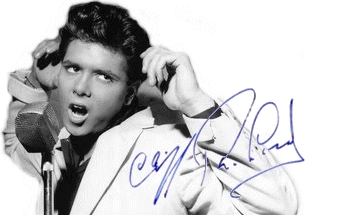 |
Cliff
Richard’s recording career is unique. He is the only artist to have achieved
No.1 hits in several of the decades that followed his first chart-topper
and can boast more than one hundred chart entries. Cliff formed his first
band, a 5-piece vocal outfit called The Quintones, while still at Cheshunt
Secondary Modern School.
On leaving school in 1957, he worked as a credit control clerk and began playing in local pubs with the Dick Teague Skiffle Group. By the following year he had formed Harry Webb and The Drifters. After playing in the 2 I’s coffee bar in Soho he met Ian Samwell, who joined the group as guitarist, and they decided to rename the band Cliff Richard and The Drifters. In August 1958 he left his job to become a full-time musician and signed a contract with EMI, making his record debut with ‘Schoolboy Crush’ which had ‘Move It’ on the flip side. A few weeks later he was appearing on Jack Good’s popular TV show ‘Oh Boy’ and performed ‘Move It’, which was now promoted as the A side and which reached No.2 in the charts. Cliff’s first million-selling record and first No. 1 hit was ‘Livin’ Doll’, which had been written by Lionel Bart for Cliff’s movie debut, ‘Serious Charge'. The number won the Ivor Novello Award. It was the only chart-topper for Cliff Richard and The Drifters. To avoid confusion with the American band The Drifters, the group changed their name to The Shadows. Cliff’s next No.1 was ‘Travellin’ Light’, penned by Sid Tepper and Roy C. Bennett, which enjoyed a five week spell at the top of the charts. In July 1960 ‘Please Don’t Tease’ hit the top spot. This was the only record personally selected as an A side by fans. |
| Cliff and
his recording manager decided to invite 80 youngsters to EMI’s HQ in Manchester
Square, London, for tea and biscuits and to listen to 24 tracks that had
been recorded at Abbey Road. Cliff and Norrie Paramor had preferred ‘Nine
Times Out Of Ten’ as the next release, but the group of young people, who
included members of Cliff’s fan club, youngsters from youth clubs and representatives
of EMI’s younger staff members, opted for ‘Please Don’t Tease’, which received
758 points. This was followed by ‘Gee Whizz It’s You’, with 724 points and
‘Nine Times Out Of Ten’ with 708. 1959 also saw Cliff starring in another
film, 'Expresso Bongo'. ‘Please Don’t Tease’ slipped from the No.1 position and then reached No.1 again a few weeks later – which also happened with ‘Summer Holiday'. It remained at the top of the charts for five weeks and was knocked off its perch by the Shadows’ first instrumental hit, ‘Apache’, on which Cliff played bongos. Shadows rhythm guitarist Bruce Welch and Peter Chester, son of comedian Charlie Chester, wrote ‘Summer Holiday'. Bruce Welch also wrote Cliff’s next No.1 ‘I Love You’, which was coupled with ‘D In Love’ and became his 9th million-selling record and his first double-A side. At this time the group were usually booked into Abbey Road studios for three hours, during which they’d cut three numbers. Apart from the double-A side, the session also produced ‘Catch Me'. ‘I Love You’/’D In Love’ provided Cliff with his first Christmas No.1. ‘D In Love’ was penned by Sid Tepper and Roy C. Bennett who were later to write ‘The Young Ones'. By the end of 1960, EMI’s managing director L.G.Wood was able to announce that Cliff had sold five and a half million records in Britain over the past two years, an unprecedented achievement. |
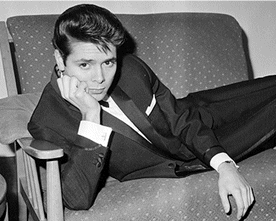 |
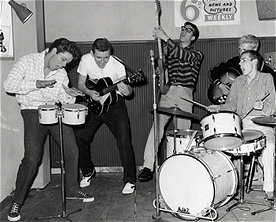 |
By
that time he was undoubtedly the biggest male star in Britain and had been
voted Top Male Singer in most music paper polls. Although he found the American
market hard to crack, he was a major star in most countries of the world,
including, outside Europe: Australia, New Zealand and South Africa. In June
1960, ‘A Girl Like You’ provided his fifth No.1 hit with a song composed
by Jerry Lordan, who’d penned the instrumental numbers ‘Apache’ and ‘Wonderful
Land’ for The Shadows. ‘The Young Ones’ went straight to No.1 during its first week of release in January 1962 and was only the fourth single in the history of the British charts to go straight to No.1. It was also No.1 in India, Australia, New Zealand, South Africa, Ireland, Belgium, The Netherlands and Japan and a big hit in Finland, Sweden, Norway, Germany, Austria, Spain, Israel, Venezuela and Chile. The song was taken from his film ‘The Young Ones’ and the soundtrack album also reached No.1 in a year when it was announced that Cliff was voted the top box office draw in British cinemas. He also received the award as Show Business Personality of the Year. His next double A side, ‘Bachelor Boy’/’The Next Time’ also reached No.1 and was taken from his film ‘Summer Holiday’. When it was discovered that the film was a few minutes short in length, Cliff and Bruce penned ‘Bachelor Boy’ within a matter of minutes for a sequence filmed in the studio. |
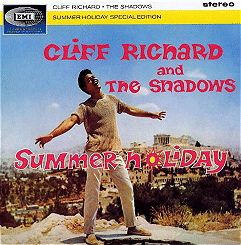 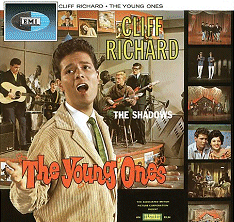 |
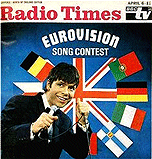 |
In
April 1965 his new chart topper was ‘The Minute You’re Gone’, which had
been recorded the previous year when Cliff had recorded in Nashville and
New York. The number was written by Jimmy Gateley and produced in Nashville
by Billy Sherrill and Bob Morgan and was Cliff’s first No.1 hit without
The Shadows. ‘The Minute You’re Gone’ hit the top of the charts just as Cliff and The Shadows were finishing a three month season in the pantomime ‘Aladdin’ at the London Palladium, with Cliff in the title role and The Shadows as Wishee, Washee, Noshee and Toshee. His 27th million-seller, ‘Congratulations’ hit the top spot in April 1968. It was the British entry for the Eurovision Song Contest, which took place at the Royal Albert Hall, London, as Britain had won the contest the previous year with Sandie Shaw’s ‘Puppet On A String’. Bill Martin and Phil Coulter, who’d also been responsible for Sandie’s hit, had written ‘Congratulations’. It lost by one point to Spain’s ‘La La La’ but proved to be a massive hit throughout Europe, even toppling ‘La La La’ from the No.1 position in Spain! It was to be another ten years before Cliff hit the No.1 spot again, which he did in August 1979 with Alan Tarney's ‘We Don’t Talk Anymore’. It was exactly twenty years and 25 days since he’d had his first No.1 and the song became Cliff’s biggest-ever hit up to that time, with over five million sales worldwide. |
| Sadly,
while the record was in the top position, Norrie Paramor, who’d recorded
all the Cliff hits of the 1960s, died. Up to that time he had produced more
No.1 hits than any other British producer. In March 1986 Cliff was back at the top of the charts yet again, with a revival of ‘Living Doll’ recorded with 'The Young Ones', the alternative comedy team. It sold over half a million copies in the UK, with proceeds donated to the Comic Relief charity. In December 1988 Cliff had his second Christmas chart-topper with ‘Mistletoe And Wine’ which was his 99th single release and the biggest selling single of the year. Christmas 1990 saw him at No.1 again with ‘Saviour’s Day’. The final Christmas of the millennium saw Cliff end the 20th century at the top of the charts with ‘The Millenium Prayer’ in December 1999. At the time of writing, Cliff has now made over 130 hit singles and E.Ps, 68 albums, had more than 250 million record sales worldwide and, during his 51-year career, only five of his records have failed to make the charts! Cliff is undoubtedly the biggest British solo singer of all time and is still as popular today as when he made his sensational debut in the 1950s. |
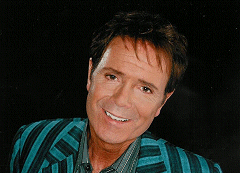 |
|
Article
|